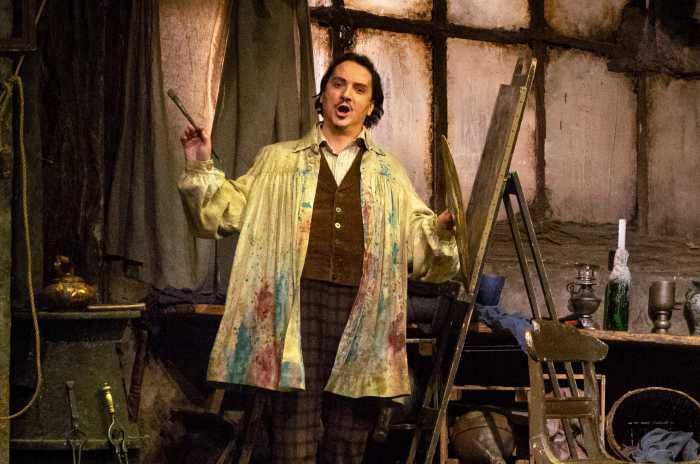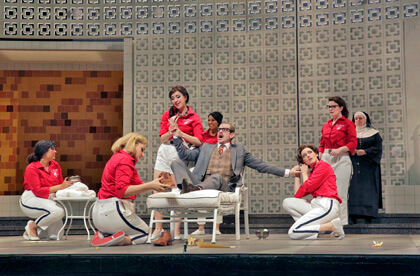Liuba Sokolova and Maria Litke in the Bard Summerscape production of Sergey Taneyev’s “Oresteia.” | CORY WEAVER
BY ELI JACOBSON | Bard Summerscape presented the US staged premiere of Sergey Taneyev’s “Oresteia” (composed 1887-1894, premiered 1895) as part of its “Stravinsky and his World” program. Taneyev (1856-1915) was a piano prodigy who later became an influential musical pedagogue and theorist. His pupils included Rachmaninoff, Scriabin, and Glière, and his two-volume treatise on counterpoint was the most advanced of its time. He was a protégé and friend of Tchaikovsky, who looked to the younger man for musical advice and criticism — though he feared Taneyev’s uncompromising opinions.
Taneyev considered his Russian-language operatic adaptation of Aeschylus’ “The Oresteia” trilogy his greatest musical achievement. Peter Tiboris and the Manhattan Philharmonic presented the dramatically intense first part, “Agamemnon,” in concert at Carnegie Hall in 2004. The final two parts, “The Libation Bearers” and “The Eumenides,” were performed in the US for the first time at Bard.
Aeschylus’ take on the House of Atreus works in some ways like an extended three-part episode of “Law and Order” — first we see the murder committed, then the investigation and pursuit of the murderers, and finally the whole thing goes to court. The final act, where Orestes is tried in Athens by a jury of citizens presided over by the goddess Athena, is an ode to the Periclean justice system that replaced vigilante honor codes with law and order.
US staged debut of Sergey Taneyev’s “Oresteia” shows it off to best effect
This is very different from Euripides’ “Electra” with its concentration on human psychology and individual will. Taneyev’s musical style is also very different from Strauss and Hoffmannsthal’s “Elektra” — a contrast between refined intellect and primal emotion. Taneyev composes in a smoothly tonal late Romantic 19th century style with no rough edges. But the violent conflicts of the story require a musical brutality and the capacity for shock and surprise, which are beyond the cerebral Taneyev. One begins to appreciate how Strauss had to push tonality into dissonance and ugliness in his “Elektra.” The most beautiful passages are the choruses of the Mycenaean people — hushed, haunting, and full of exotically spiced harmonies owing much to Russian choral tradition. The arias and duets flow along in well-ordered musical paragraphs but never rise to powerful dramatic eloquence or individual musical inspiration.
Given that Taneyev’s music is firmly grounded in a 19th century eastern European style, stage director Thaddeus Strassberger’s decision to update the action to the late czarist period in Russia worked perfectly. The tilted perspectives of Madeleine Boyd’s unit set represented the entrance to a dilapidated neoclassical palace but changed easily into the twisting corridors inside, the desert plain, and Apollo’s temple in the later sections.
The cast, almost entirely Russian, was comprised of several talented leading artists from secondary opera companies in St. Petersburg and Moscow. Liuba Sokolova’s contralto Clytemnestra initially sounded a bit woolly. But as the queen descended into guilt and paranoia, her Slavic earth mother tones became haunting and sorrow-laden. Taneyev’s Electra is, rather incongruously for Strauss fans, a lyric soprano ingénue. Soprano Olga Tolkmit’s wide-eyed girlish appearance belied her character’s incestuous attachment to her late father and brother and her descent into bloodthirsty dementia at the end of the second act. Tolkmit has a vibrant full lyric soprano one longs to hear unleashed in Tchaikovsky and Rimsky-Korsakov operas. Maria Litke’s richly resonant soprano embodied the fateful Cassandra and an authoritative Pallas Athena.
Andrey Borisenko’s burly baritone made an imposing Aegisthus and Apollo. As Orestes, the penetrating tenor of Mikhail Vekua managed the ungrateful high, declamatory music without tiring but his presence and timbre were unheroic. Maxim Kuzmin-Karavaev’s light-toned lyric bass and diffident stage manner missed the kingly gravitas of Agamemnon.
Dr. Leon Botstein, leading his excellent American Symphony Orchestra, was well-suited to Taneyev’s weighty intellectual idiom. This production (a co-production with the Mariinsky Theater) made the best possible case for Taneyev’s neglected opera without hiding the underlying reasons for its obscurity.
The Mostly Mozart Festival’s vocal offerings provided solace to New York voice fans suffering the summer drought of the Met’s off-season. Mezzo Alice Coote headlined a Mozart-Beethoven concert on July 31 with gripping, interpretively hands-on accounts of Mozart’s concert aria “Ch’io mi scordi di te… Non temer, amato bene” and Sesto’s aria “Parto, parto ma tu ben mio” from “La Clemenza di Tito.” The recitatives were performed with perfervid veristic intensity and vividly painted textual delivery. However, as in her Handel Sesto in the Met’s “Giulio Cesare” this spring, Coote lacked repose and controlled legato in the andante sections — the tone often became breathy and bumpy in phrasing. French pianist Jean-Efflam Bavouzet stunned me with an almost throwaway quicksilver silken virtuosity in Beethoven’s “Piano Concerto No. 4 in G major.” Bavouzet was magisterially in control of a myriad of nuances and colors and yet it was all delivered naturally without effort.
Conductor Louis Langrée delivered light, fleet readings of the “Coriolan Overture” and the “Symphony No. 7 in A major” with exaggerated and eccentric tempo choices and little internal cohesion.
On August 14, Gianandrea Noseda was a more convincing Beethoven interpreter in the “Symphony No. 2 in D major.” Rossini’s “Stabat Mater,” with the US debut of fast-rising Italian soprano Maria Agresta, comprised the program’s second half. Agresta has a compact penetrating, dark lyric soprano that is well-balanced with an easy, if occasionally over-vibrant, top. Her European repertoire includes parts like Norma and early Verdi heroines but she will come to the Met in future seasons as Mimi and Micaela. Mezzo Daniela Barcellona, too long absent from New York stages, reveled in a large, warm round tone that enveloped the listener. Veteran bel canto tenor Gregory Kunde, who has now ventured into heavy Verdi roles, showed some dryness and spread tone in the middle yet he capped “Cujus Animam” with a secure, loud high D-flat. Bass Kyle Ketelsen impressed with a focused tone and excellent coloratura flexibility. Noseda enjoyed great rapport with the Mostly Mozart Orchestra, which played with great vitality, tonal warmth, and passion all evening.



































